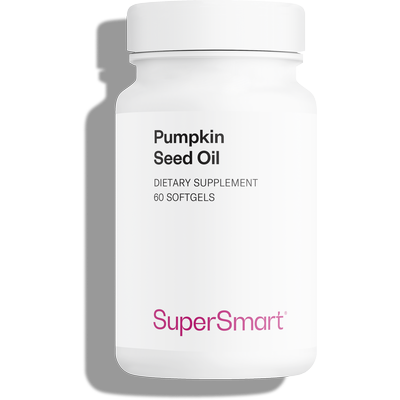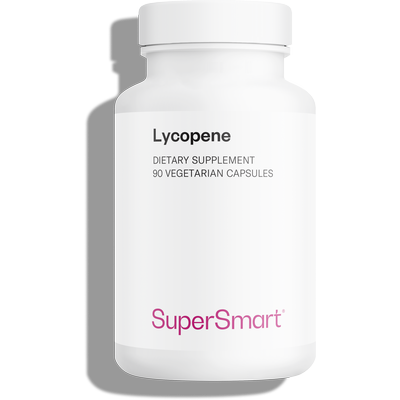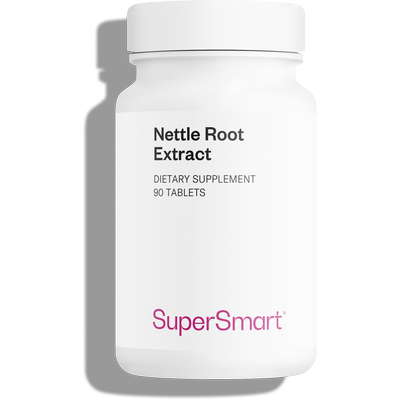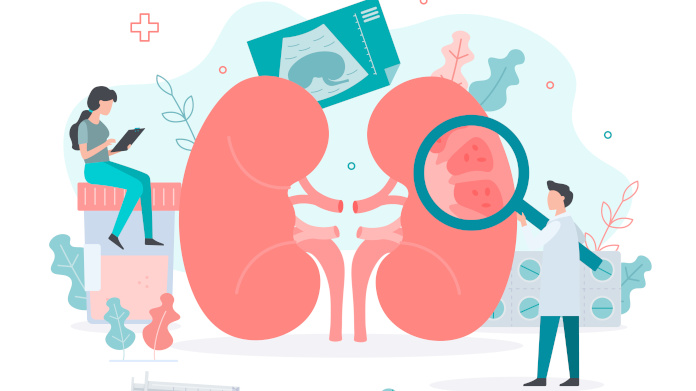
Reminder: what exactly is the prostate?
Part of the male reproductive system, the prostate is a small gland located just below the bladder, in front of the rectum. Its main function is to produce sperm-containing semen at the moment of ejaculation (1).
In a young man, the prostate is the size of a walnut, but tends to gradually expand from the age of 40 onwards … potentially reaching the size of a kiwi fruit. When it enlarges to the point of causing problems with urination, it is referred to as benign prostatic hyperplasia (BPH) (2).
This functional disorder is very common with advancing age, affecting around 60% of men over 60 and 80%-90% of men over 70 (3). It may be accompanied by nocturia (frequent waking in the night to pass urine) and a higher risk of bladder stones (4).
It is distinct from prostate cancer, in which tumour cells proliferate in glandular tissue. It produces few symptoms in its early stages. Though rare before the age of 50, ageing, a family history, ethnic origin, excess weight and tall height in adulthood (a sign of increased exposure to growth factors during childhood) are all known risk factors (5).
Chocolate and prostate: what does the research say?
Potentially protective antioxidants
Cocoa beans contain a synergy of polyphenols (flavonoids, catechins, epicatechins, proanthocyanidins...) with established benefits for human health (6).
In terms of the prostate, an in vitro study on human prostate cells demonstrated inhibited growth of cancer cell lines following treatment with cocoa polyphenol extracts (7). However, since this anti-proliferative effect was not confirmed in healthy cell lines, uncertainty remains over the question of any preventive benefit.
Another study, this time in rats, suggests these same polyphenols may be able to combat prostatic hyperplasia induced by testosterone propionate (8).
The problem of methylxanthines
On the other hand, chocolate contains caffeine and theobromine, molecules from the methylxanthine family responsible for its stimulant effects (9). A number of studies suggest that when consumed in excess, these substances could alter the morphology and physiology of the prostate. High intake of theobromine may thus increase the risk of prostate cancer.
By way of example, a study of 5-week old rats showed increases in testosterone and dihydrotestosterone plasma levels, prostate weight, proliferation of epithelial tissue and expression of androgen receptors in caffeine-treated animals (10). In this respect, the study’s authors suggest a correlation between chronic caffeine consumption (from puberty) and development of benign prostatic hyperplasia. Vidal, the famous French medical reference, also states that “chocolate aggravates symptoms of benign prostatic hyperplasia”.
Chocolate and prostate health: what’s the verdict?
Given the contradictions raised by chocolate’s composition, it seems wise to play it safe by moderating your daily consumption if you have risk factors and diagnosed prostate problems. Note too, that exactly the same basic questions apply to coffee and the prostate.
Forbidden foods for prostate health
While the ‘jury is still out’ on the relationship between chocolate and the prostate, there seems to be more of a consensus when it comes to some other foods.
Yogurt and the prostate
According to several epidemiological studies, frequent consumption of dairy products may increase prostate cancer risk (11). This may be due both to their saturated fat and calcium content, as well as the increase in IGF-1 growth factor induced by their ingestion.
Charred red meat
While red meat and deli meats are respectively classed as probable and proven carcinogens for humans, it seems that cooking at high temperatures, which generates heterocyclic amines, precipitates the onset of prostate tumours (12). So if you’re a big meat-lover, it’s best to opt for gentler cooking methods (steaming, simmering ...).
To maintain a healthy prostate, men are strongly recommended to adopt a Mediterranean type diet containing fresh fruit and vegetables (garlic, onions, cruciferous vegetables...), fibre (pulses, whole grains...) and a good amount of healthy fats (olive or rapeseed oil, avocados, walnuts, oily fish...) (13-14).
Take care with omega-6
Excessive consumption of omega-6 fatty acids may maintain inflammation of the prostate (15). It’s therefore important to limit your intake of seeds, oilseeds and vegetable oils containing high levels of omega-6: sunflower, grapeseed, corn...
Supplements to support prostate health
Alongside a balanced diet and healthy lifestyle, you can also support your prostate function with targeted supplements.
Among the most widely-studied plants in this respect are saw palmetto, which supports urinary function in those with an enlarged prostate, and pygeum africanum, which plays a role in the health of theprostate, bladder and lower urinary tract (both can be found in synergy in the optimised formulation ProstaNatural Formula, which also contains zinc and beta-sitosterol) (16-17).
Recommended by ESCOP, nettle root (the star ingredient in Nettle Root Formula) also supports a healthy prostate, especially through its ability to inhibit the conversion of testosterone into dihydrotestosterone, a key mechanism in the onset of prostatic hyperplasia (18).
The prostate is particularly vulnerable to oxidative stress. Lycopene, a carotenoid found in abundance in cooked tomatoes, watermelon, grapefruit and pomegranate seeds, is thought to confer a a protective action at a cellular level (the supplement Lycopene standardised to 10% benefits from a patented microencapsulation process to maximise its bioavailability) (19).
And finally, we mustn’t forget pumpkin seeds. A source of phytosterols and zinc (which helps maintain normal blood testosterone levels), they have been the subject of numerous studies related to prostate size, urinary discomfort and problematic micturition (the supplement Pumpkin Seed Oil also has added vitamin E for optimal preservation) (20).
SUPERSMART ADVICE
References
- Singh O, Bolla SR. Anatomy, Abdomen and Pelvis, Prostate. [Updated 2022 Jul 25]. In: StatPearls [Internet]. Treasure Island (FL): StatPearls Publishing; 2023 Jan-. Available from: https://www.ncbi.nlm.nih.gov/books/NBK540987/
- Ng M, Baradhi KM. Benign Prostatic Hyperplasia. [Updated 2022 Aug 8]. In: StatPearls [Internet]. Treasure Island (FL): StatPearls Publishing; 2023 Jan-. Available from: https://www.ncbi.nlm.nih.gov/books/NBK558920/
- Ng M, Baradhi KM. Benign Prostatic Hyperplasia. 2022 Aug 8. In: StatPearls [Internet]. Treasure Island (FL): StatPearls Publishing; 2023 Jan–. PMID: 32644346.
- Hyun JS. Clinical Significance of Prostatic Calculi: A Review. World J Mens Health. 2018 Jan;36(1):15-21. doi: 10.5534/wjmh.17018. Epub 2017 Sep 25. PMID: 29076299; PMCID: PMC5756803.
- Leslie SW, Soon-Sutton TL, R I A, et al. Prostate Cancer. [Updated 2023 May 30]. In: StatPearls [Internet]. Treasure Island (FL): StatPearls Publishing; 2023 Jan-. Available from: https://www.ncbi.nlm.nih.gov/books/NBK470550/
- Andújar I, Recio MC, Giner RM, Ríos JL. Cocoa polyphenols and their potential benefits for human health. Oxid Med Cell Longev. 2012;2012:906252. doi: 10.1155/2012/906252. Epub 2012 Oct 24. PMID: 23150750; PMCID: PMC3488419.
- Jourdain C, Tenca G, Deguercy A, Troplin P, Poelman D. In-vitro effects of polyphenols from cocoa and beta-sitosterol on the growth of human prostate cancer and normal cells. Eur J Cancer Prev. 2006 Aug;15(4):353-61. doi: 10.1097/00008469-200608000-00009. PMID: 16835506.
- Bisson JF, Hidalgo S, Rozan P, Messaoudi M. Therapeutic effect of ACTICOA powder, a cocoa polyphenolic extract, on experimentally induced prostate hyperplasia in Wistar-Unilever rats. J Med Food. 2007 Dec;10(4):628-35. doi: 10.1089/jmf.2006.242. PMID: 18158833.
- Martínez-Pinilla E, Oñatibia-Astibia A, Franco R. The relevance of theobromine for the beneficial effects of cocoa consumption. Front Pharmacol. 2015 Feb 20;6:30. doi: 10.3389/fphar.2015.00030. PMID: 25750625; PMCID: PMC4335269.
- Bisson JF, Hidalgo S, Rozan P, Messaoudi M. Therapeutic effect of ACTICOA powder, a cocoa polyphenolic extract, on experimentally induced prostate hyperplasia in Wistar-Unilever rats. J Med Food. 2007 Dec;10(4):628-35. doi: 10.1089/jmf.2006.242. PMID: 18158833.
- Sargsyan A, Dubasi HB. Milk Consumption and Prostate Cancer: A Systematic Review. World J Mens Health. 2021 Jul;39(3):419-428. doi: 10.5534/wjmh.200051. Epub 2020 Jul 27. PMID: 32777868; PMCID: PMC8255404.
- Sander A, Linseisen J, Rohrmann S. Intake of heterocyclic aromatic amines and the risk of prostate cancer in the EPIC-Heidelberg cohort. Cancer Causes Control. 2011 Jan;22(1):109-14. doi: 10.1007/s10552-010-9680-9. Epub 2010 Nov 20. PMID: 21103922.
- Castelló A, Boldo E, Amiano P, Castaño-Vinyals G, Aragonés N, Gómez-Acebo I, Peiró R, Jimenez-Moleón JJ, Alguacil J, Tardón A, Cecchini L, Lope V, Dierssen-Sotos T, Mengual L, Kogevinas M, Pollán M, Pérez-Gómez B; MCC-Spain Researchers. Mediterranean Dietary Pattern is Associated with Low Risk of Aggressive Prostate Cancer: MCC-Spain Study. J Urol. 2018 Feb;199(2):430-437. doi: 10.1016/j.juro.2017.08.087. Epub 2017 Aug 23. PMID: 28842246.
- Capurso C, Vendemiale G. The Mediterranean Diet Reduces the Risk and Mortality of the Prostate Cancer: A Narrative Review. Front Nutr. 2017 Aug 24;4:38. doi: 10.3389/fnut.2017.00038. PMID: 28884114; PMCID: PMC5573712.
- Kelavkar UP, Hutzley J, Dhir R, Kim P, Allen KG, McHugh K. Prostate tumor growth and recurrence can be modulated by the omega-6:omega-3 ratio in diet: athymic mouse xenograft model simulating radical prostatectomy. 2006 Feb;8(2):112-24. doi: 10.1593/neo.05637. PMID: 16611404; PMCID: PMC1578514.
- Kwon Y. Use of saw palmetto (Serenoa repens) extract for benign prostatic hyperplasia. Food Sci Biotechnol. 2019 Apr 17;28(6):1599-1606. doi: 10.1007/s10068-019-00605-9. PMID: 31807332; PMCID: PMC6859144.
- Wilt T, Ishani A, Mac Donald R, Rutks I, Stark G. Pygeum africanum for benign prostatic hyperplasia. Cochrane Database Syst Rev. 2002;1998(1):CD001044. doi: 10.1002/14651858.CD001044. PMID: 11869585; PMCID: PMC7032619.
- Ghorbanibirgani A, Khalili A, Zamani L. The efficacy of stinging nettle (urtica dioica) in patients with benign prostatic hyperplasia: a randomized double-blind study in 100 patients. Iran Red Crescent Med J. 2013 Jan;15(1):9-10. doi: 10.5812/ircmj.2386. Epub 2013 Jan 5. PMID: 23487561; PMCID: PMC3589769.
- Chen P, Zhang W, Wang X, Zhao K, Negi DS, Zhuo L, Qi M, Wang X, Zhang X. Lycopene and Risk of Prostate Cancer: A Systematic Review and Meta-Analysis. Medicine (Baltimore). 2015 Aug;94(33):e1260. doi: 10.1097/MD.0000000000001260. PMID: 26287411; PMCID: PMC4616444.
- Damiano R, Cai T, Fornara P, Franzese CA, Leonardi R, Mirone V. The role of Cucurbita pepo in the management of patients affected by lower urinary tract symptoms due to benign prostatic hyperplasia: A narrative review. Arch Ital Urol Androl. 2016 Jul 4;88(2):136-43. doi: 10.4081/aiua.2016.2.136. PMID: 27377091.
66 Days
Fiables y Recomendables
Como siempre estáis siempre ofreciendo alternativas naturales a los diversos problemas de Salud con un buen despliegue de información y una variada gama de productos. Y os felicito por el servicio de entrega que hacéis ahora que supera con creces el de antes.
Mariano Navarro Sanchez
66 Days
produits innovants
produits innovants, avec une composition claire
véronique de sainte marie
66 Days
Ravie et Très Satisfaite de Ma Commande…
Ravie et Très Satisfaite de Ma Commande et de Mes Commandes Très Bons Produits
Brigitte D.
66 Days
Produits fiables
Produits fiables
jacqueline
66 Days
Tout est OK 👌
Tout est OK 👌
RICHARD Bertrand
66 Days
Bestelle das Produkt seit Jahren immer…
Bestelle das Produkt seit Jahren immer wieder ist echt super, Preis Leistung ist ok könnte noch ein bisschen billiger sein aber sonst ok
SONJA Hofbauer
67 Days
Commentaire
Excellent services
DIDDY Mohamed
67 Days
Livraison rapide
Livraison rapide
devouass
67 Days
Schnelle Lieferung
Schnelle Lieferung. Gute Begleitung der Lieferung
SCHARWAECHTER Hans Juergen
67 Days
Efficace rapidement
J’ai commencé à prendre les facteurs de croissance osseuse alors que j’étais en plein accès douloureux d’ostéoporose. Mon état s’est stabilisé en quelques jours puis les douleurs ont diminué régulièrement. Je pense continuer ce remède pendant quelques mois puis 1 gélule par jour et une pause etc..
Françoise Delfour
67 Days
Rapidité de livraison avec prestataire…
Rapidité de livraison avec prestataire fiable ! Toujours impeccable.
Virginie
67 Days
Siempre buenas experiencias y cada vez…
Siempre buenas experiencias y cada vez más rápidos los envíos
Elsje Fokkelman
67 Days
Livraison rapide et en parfait état
Livraison rapide et en parfait état. Jamais d'erreur.
WUILLEMIN Sylvie
67 Days
J'ai trouvé rapidement sur le site le…
J'ai trouvé rapidement sur le site le complément qui m'était nécessaire et la livraison a été très rapide. Merci.
Client
67 Days
Je recommande ces produits
Facilité pour passer les commandes. Délais de livraison tenus. Produits de qualité. Je suis cliente depuis longtemps et très satisfaite.
Alexandre PUBERT






